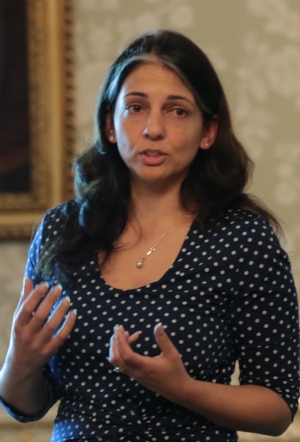Senior medical staff should help allied health professionals with their research
by Maxine Myers

Senior medical staff can help develop allied health professionals by supervising their research, explained academics at an Imperial event.
The research supervision networking event took place on Monday 7 December at Imperial’s South Kensington Campus. The purpose of the evening was to attract senior medical academics at Imperial to supervise allied health professionals working in areas such as physiotherapy, as well as nurses, midwives and pharmacists during their research studies.
More than 30 delegates working in hospitals and universities across north west London attended the event to learn more about supervising allied health professionals and other healthcare workers and to find out about current opportunities.
At the event, Professor Jonathan Weber, Director of Imperial College Academic Health Science Centre (AHSC), explained that providing research opportunities for allied health professionals and other healthcare workers is a key mission of Imperial College AHSC. He said:
We recognise that allied health professionals, nurses and other health workers have a unique perspective on patient care that should be utilised through research and development programmes.
– Professor Jonathan Weber
Director of Imperial College AHSC
“We recognise that allied health professionals, nurses and other health workers have a unique perspective on patient care that should be utilised through research and development programmes. We want to build an environment where our allied health professionals and other health workers can conduct robust research that could lead to benefits for patients, as well as progress in their clinical academic careers. In order to achieve this objective we need our senior medical staff to share their expertise as research supervisors and help develop this group of healthcare workers.”
Dr Jeremy Levy, Director of the Clinical Academic Training Office (CATO), which organised the event, told delegates that research supervision is vital in order to help allied health professionals and other healthcare workers to develop.
“Imperial College AHSC wants to foster a research culture across Imperial College Healthcare NHS Trust. In order to do this we need more allied health professionals and other healthcare workers to engage in research so that we can improve health outcome for patients. Senior medical staff can play a vital role by sharing their knowledge, skills and experiences in a supervisory role. I hope our delegates feel inspired to support our efforts and sign up to supervise our talented healthcare workers.”
Delegates also had the opportunity to hear from academics about their experience of working across professional boundaries in research settings. Professor Bryony Dean Franklin, Executive Lead Pharmacist at Imperial College Healthcare NHS Trust, shared her experience of supervising PhD students from pharmacy and other healthcare backgrounds, usually as part of a multi-professional supervisory team. She said:
“Multi-professional supervision can be really rewarding for both research students and supervisors, as we all learn from each other’s complementary perspectives. I gained new insights into patient care which have had a positive impact on my own clinical activities.”

Professor Bryony Dean Franklin, Executive Lead Pharmacist at Imperial College Healthcare NHS Trust
Dr Lina Johansson, Honorary Clinical Lecturer in nutrition and dietetics at Imperial College Healthcare NHS Trust, also shared her experience of working with her medical academic supervisor when she carried out her PhD at Imperial on renal care. She said:

Dr Lina Johansson, Honorary Clinical Lecturer in nutrition and dietetics at Imperial College Healthcare NHS Trust
“I really benefited from working with my supervisor, a renal consultant, during my PhD and gained new insights and significant research support that helped me with my research which I would not have gained without cross-professional supervision. I was able to use this experience as a stepping stone to developing my clinical academic career, and winning an NIHR clinical lecturer post.”
Delegates also had the opportunity to take part in a discussion on new resources to help support those providing or receiving supervision.
Article text (excluding photos or graphics) © Imperial College London.
Photos and graphics subject to third party copyright used with permission or © Imperial College London.
Reporter
Maxine Myers
Communications Division